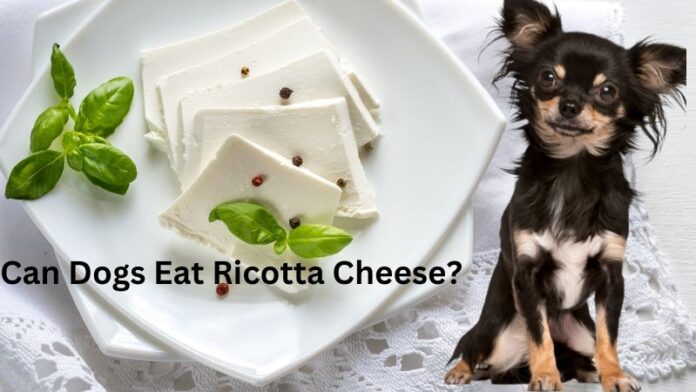Hey there, fellow dog parents! Ever caught your pup giving you those irresistible puppy eyes while you’re enjoying some ricotta cheese? I’ve been there too! Today, let’s dive deep into everything you need to know about feeding ricotta cheese to your four-legged bestie.
The Quick Answer
Yes, dogs can eat ricotta cheese in moderation! It’s actually one of the safer cheese options for our canine companions. But hold up – before you start sharing your lasagna with Fido, there’s some important stuff you should know.
Why Ricotta Cheese Can Be Good for Dogs
Listen up because there’s some pretty cool benefits to sharing a bit of ricotta with your pup
- Protein Power: Ricotta’s packed with protein that helps keep those muscles strong
- Calcium Boost: Great for maintaining healthy bones and teeth
- Low in Salt: Compared to other cheeses, ricotta’s usually lower in sodium
- Easy to Digest: It’s one of the gentler cheese options for doggy tummies
The Not-So-Great Stuff (Keep This in Mind!)
Okay. here’s where we gotta be careful
- Calories: Ricotta’s pretty rich, y’all! Too much can make your pup pack on the pounds
- Lactose Content: While lower than many cheeses, it’s still there
- Fat Content: Can cause tummy troubles if your dog goes overboard
How to Safely Share Ricotta With Your Dog
Here’s my tried-and-true tips for treating your pup to some ricotta:
Start Small
- Begin with just a teaspoon
- Watch for any reaction
- Wait 24 hours before giving more
Serving Suggestions
- Mix a small amount with their regular food
- Use as a pill pocket alternative
- Freeze small portions for a cool summer treat
- Add to homemade dog treats
When to Say “No” to Ricotta
Just because ricotta can be safe doesn’t mean it’s right for every dog. Skip it if:
- Your dog’s lactose intolerant
- They’re overweight or obese
- They have a history of pancreatitis
- The ricotta contains additives like garlic or herbs
Signs Your Dog Might Not Handle Ricotta Well
Keep an eye out for these symptoms after giving ricotta:
- Vomiting
- Diarrhea
- Excessive gas
- Lethargy
- Loss of appetite
Smart Ways to Include Ricotta in Your Dog’s Diet
Wanna be extra creative? Try these fun ideas:
-
The Kong Stuffing
- Mix ricotta with some plain pumpkin puree
- Stuff into a Kong toy
- Freeze for a longer-lasting treat
-
The Training Treat Mix
- Blend small amount with lean meat
- Roll into tiny balls
- Perfect for training sessions!
-
The Cooling Summer Treat
- Mix ricotta with plain yogurt
- Freeze in ice cube trays
- Great for hot days!
Better Alternatives to Ricotta
If you’re not sure about ricotta, try these instead:
- Cottage cheese (lower in fat)
- Plain Greek yogurt
- Small pieces of hard cheese
- Cream cheese (in tiny amounts)
Common Questions About Dogs and Ricotta
How much ricotta can I give my dog?
The general rule of thumb is:- Small dogs: 1-2 teaspoons- Medium dogs: 1-2 tablespoons- Large dogs: 2-3 tablespoons
Never exceed these amounts in one sitting!
Can puppies eat ricotta?
While technically they can, it’s better to wait until they’re at least 6 months old. Their digestive systems are still developing, and they’re more sensitive to dairy products.
What about flavored ricotta?
Stick to plain ricotta only! Flavored varieties might contain harmful ingredients like garlic, herbs, or artificial sweeteners.
The Bottom Line
Ricotta can be a yummy, safe treat for most dogs when given properly. Just remember:
- Moderation is key
- Start small
- Watch for reactions
- Choose plain varieties only
- Consider your dog’s overall health
Pro Tips for Ricotta-Sharing Success
- Buy fresh ricotta when possible
- Check the ingredients list carefully
- Store properly in the fridge
- Don’t leave it out more than 2 hours
- Toss any uneaten portions after 3-4 days
Final Thoughts
Sharing food with our furry friends can be such a joy, but it’s super important to do it safely! Ricotta can be a fantastic occasional treat for most dogs, but like everything in life, moderation is key. Keep portions small, watch for any negative reactions, and always put your pup’s health first.
Remember, every dog is different – what works for one might not work for another. When in doubt, chat with your vet before introducing any new foods to your dog’s diet.
Now go ahead and share a little ricotta love with your four-legged friend (if their tummy can handle it)! Just don’t blame me if they start begging every time you open the fridge!
Disclaimer: This article is for informational purposes only. Always consult with your veterinarian before making significant changes to your dog’s diet.












